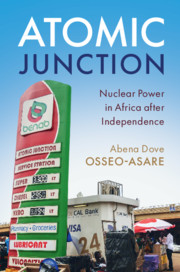Book contents
- Atomic Junction
- Atomic Junction
- Copyright page
- Epigraph
- Contents
- Figures
- Preface: Nuclear Reveries
- Acknowledgments
- Abbreviations
- 1 Introduction: “No Country has Monopoly of Ability”
- 2 Nuclear Winds: Particles without Boundaries
- 3 Scientific Equity: Physics from the Soviets
- 4 Atomic Reactors: A Fission Facility for Ghana
- 5 Radiation Within: Monitoring Particles in Bodies
- 6 Atomic Lands: Risks on a Nuclear Frontier
- Epilogue: Nuclear Power at the Crossroads
- Notes
- Persons Cited and Consulted
- Works Cited and Consulted
- Index
1 - Introduction: “No Country has Monopoly of Ability”
Published online by Cambridge University Press: 12 September 2019
- Atomic Junction
- Atomic Junction
- Copyright page
- Epigraph
- Contents
- Figures
- Preface: Nuclear Reveries
- Acknowledgments
- Abbreviations
- 1 Introduction: “No Country has Monopoly of Ability”
- 2 Nuclear Winds: Particles without Boundaries
- 3 Scientific Equity: Physics from the Soviets
- 4 Atomic Reactors: A Fission Facility for Ghana
- 5 Radiation Within: Monitoring Particles in Bodies
- 6 Atomic Lands: Risks on a Nuclear Frontier
- Epilogue: Nuclear Power at the Crossroads
- Notes
- Persons Cited and Consulted
- Works Cited and Consulted
- Index
Summary
The introduction begins with Ghana’s president Kwame Nkrumah (1957-1966) laying the foundation stone of the first reactor building at the new Ghana Atomic Energy Commission in Kwabenya. He promoted “scientific equity” and access to science for all citizens. The nuclear energy project, headed by the engineering professor R.P. Baffour, topped Nkrumah’s plans for scientific development. Nkrumah sent Baffour to the Soviet Union to negotiate with Prime Minister Khrushchev to see what resources Ghana might provide in exchange for technical assistance and a reactor. Nkrumah and his closest advisors asserted a new African vision for nuclear power, predicated on the idea that all countries had citizens with equal intellectual capabilities. Nkrumah expressed, “no country has monopoly of ability.” Ghana was among several independent African nations interested in nuclear energy and the peaceful uses of the atom including Tanzania, Libya, and Nigeria. Julius Nyere and Kenya’s Ali Mazuri stressed that Africans would be more capable of managing nuclear energy than Europeans. The introduction interrogates this assertion through a discussion of scientific equity, manpower and human capacity, and urban dynamics at Atomic Junction. It locates Ghana’s story within scholarship on the rise of nuclear power elsewhere, especially in India and South Africa.
Keywords
- Type
- Chapter
- Information
- Atomic JunctionNuclear Power in Africa after Independence, pp. 1 - 18Publisher: Cambridge University PressPrint publication year: 2019



